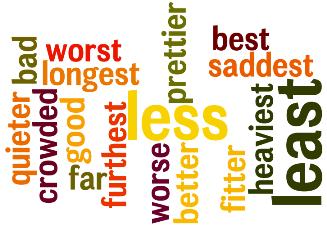
Image via http://bit.ly/18gb5FA
Hello there!
Uns anos atrás publiquei dois artigos sobre a formação do comparativo e superlativo em inglês. Você pode checar a parte 01 e 02 clicando nos links.
E hoje vamos aprofundar um pouco mais este assunto com quatro dicas mais avançadas. Are you ready?
1. Usamos as seguintes expressões com os comparativos:
much – muito
a lot – muito
far – muito
a bit – um pouco
a little – um pouco
slightly – um pouco
Veja alguns exemplos:
Going by bus is much cheaper than going by car. – Ir de ônibus é muito mais barato do que ir de carro.
“How are you feeling?” “Much better, thanks.” – “Como você está se sentindo?” “Muito melhor, obrigado.”
Going by car is a lot more expensive. – Ir de carro é muito mais caro.
Please, speak a bit more slowly. – Por favor, fale um pouco mais devagar.
This book is slightly heavier than the other one. – Este livro é um pouco mais pesado do que o outro.
Her illness is far more serious than we thought. – A doença dela é muito mais séria do que pensávamos.
2. Podemos usar any e no com o comparativo para dar ênfase.
I can’t wait any longer. – Não consigo esperar mais.
I thought their house was very big, but it’s no bigger than ours. – Achei que a casa deles era muito grande, mas não é (nada) maior do que a nossa.
Do you feel any better now? – Está se sentindo melhor agora?
3. O comparativo gradual acontece quando repetimos a forma do adjetivo no comparativo e a palavra and. Corresponde ao nosso “cada vez mais…”.
Your English is getting better and better. – Seu inglês está ficando cada vez melhor.
This city is getting bigger and bigger. – Esta cidade está ficando cada vez maior.
I got more and more bored in my job. – Fiquei cada vez mais entediado no meu trabalho.
4. The… the…
We should leave the sooner the better. – Devemos ir embora o mais cedo possível.
I need a big box. The bigger the better. – Preciso de uma caixa grande. Quanto maior, melhor.
When I travel, the less luggage I have the better. – Quando eu viajo, quanto menos bagagem eu tiver, melhor.
The sooner you leave, the earlier you’ll arrive. – Quanto mais cedo você sair, mais cedo você vai chegar.
The younger you are, the easier it is to learn. – Quanto mais jovem você é, mais fácil é de aprender.
The more expensive the hotel, the better the service. – Quanto mais caro o hotel, melhor o serviço.
The more I thought about the plan, the less I liked it. – Quanto mais eu pensava no plano, menos eu gostava.
This is it for today! See you next time!
Fonte: Grammar in Use, Raymond Murphy.






Comments:
Inês:
Boa noite, muito bom esse post. Obrigada
luis Romeu:
It´s very good to learn with you,I woud like to learn more and more with you!!thank you